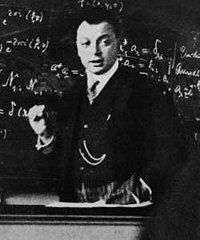
Photo from wikipedia
We propose an analogy between the quantum physics of a black hole in its late stages of the evaporation process and a superfluid Bose-Einstein condensate (BEC), based on the Horowitz… Click to show full abstract
We propose an analogy between the quantum physics of a black hole in its late stages of the evaporation process and a superfluid Bose-Einstein condensate (BEC), based on the Horowitz and Maldacena quantum final-state projection model [J. High Energy Phys. 02 (2004), 008]. The superfluid region is considered to be analogous to the interior of a black hole, and the normal fluid/superfluid interface is compared to the event horizon of a black hole. We theoretically investigate the possibility of recovering the wave function of particles incident on a superfluid BEC from the normal fluid, facilitated by the mode conversion processes occurring at the normal fluid/superfluid BEC interface. We also study how the correlations of an infalling mode with an external memory system can be preserved in the process, similar to Hayden and Preskill's ``information mirror'' model for a black hole [J. High Energy Phys. 09 (2007), 120]. Based on these analogies, we conjecture that the quantum state of bosons entering a black hole in its final state is the superfluid quantum ground state of interacting bosons. Our analogy suggests that the wave function of bosons falling into a black hole can be recovered from the outgoing Hawking modes. In the particular case in which a holelike quasiparticle (a density dip) is incident on the superfluid BEC causing the superfluid to shrink in size, our model indicates that the evaporation is unitary.
Journal Title: Physical Review D
Year Published: 2018
Link to full text (if available)
Share on Social Media: Sign Up to like & get
recommendations!